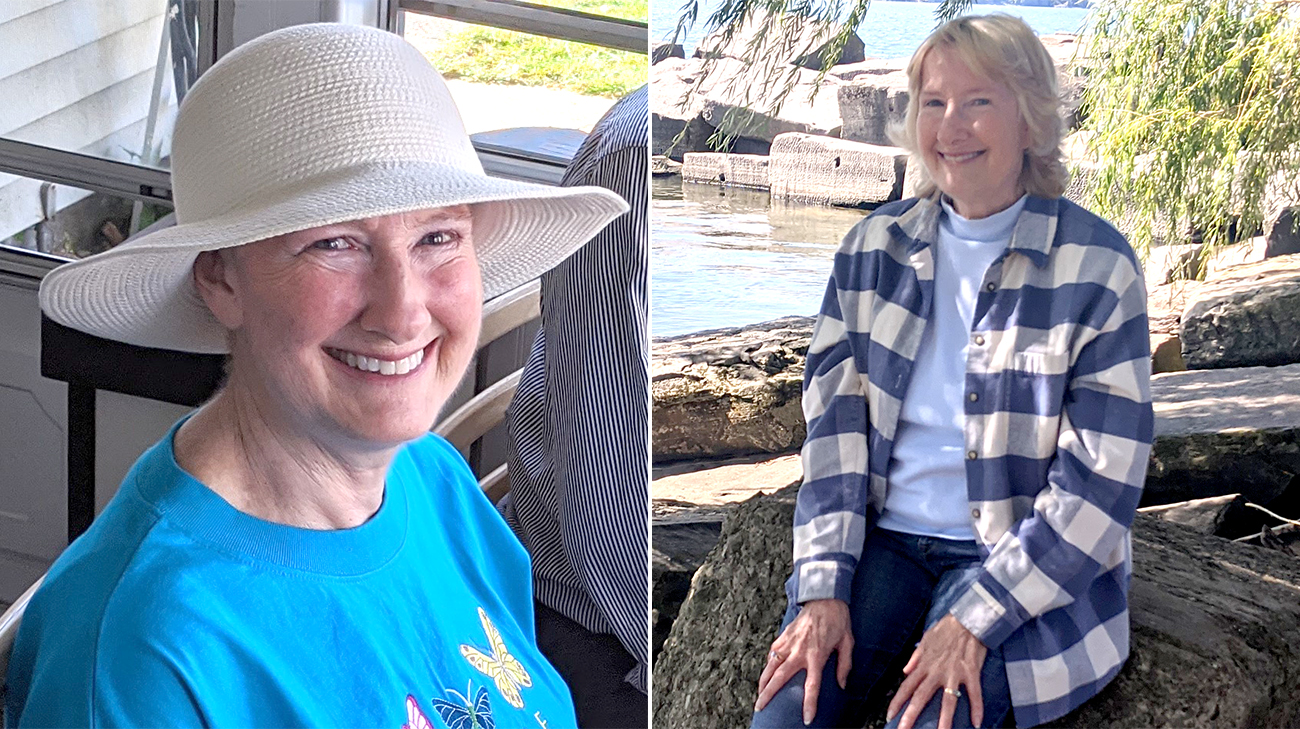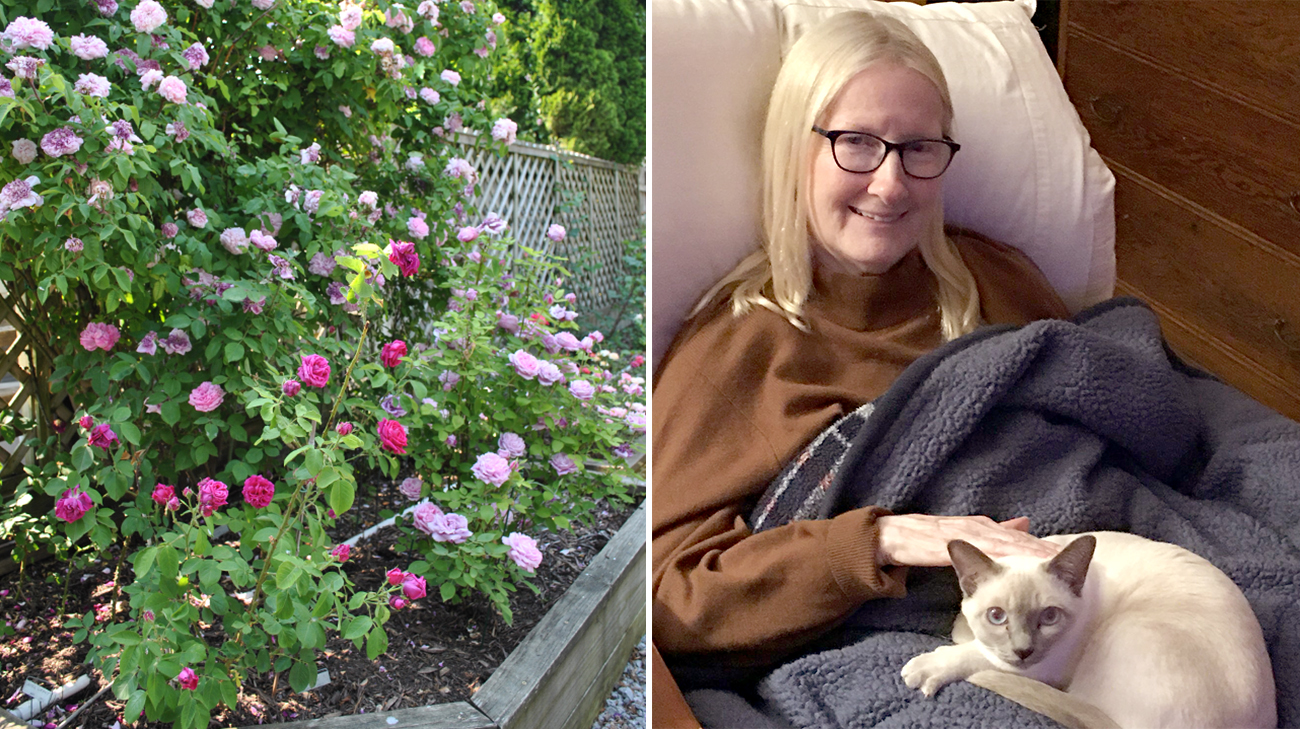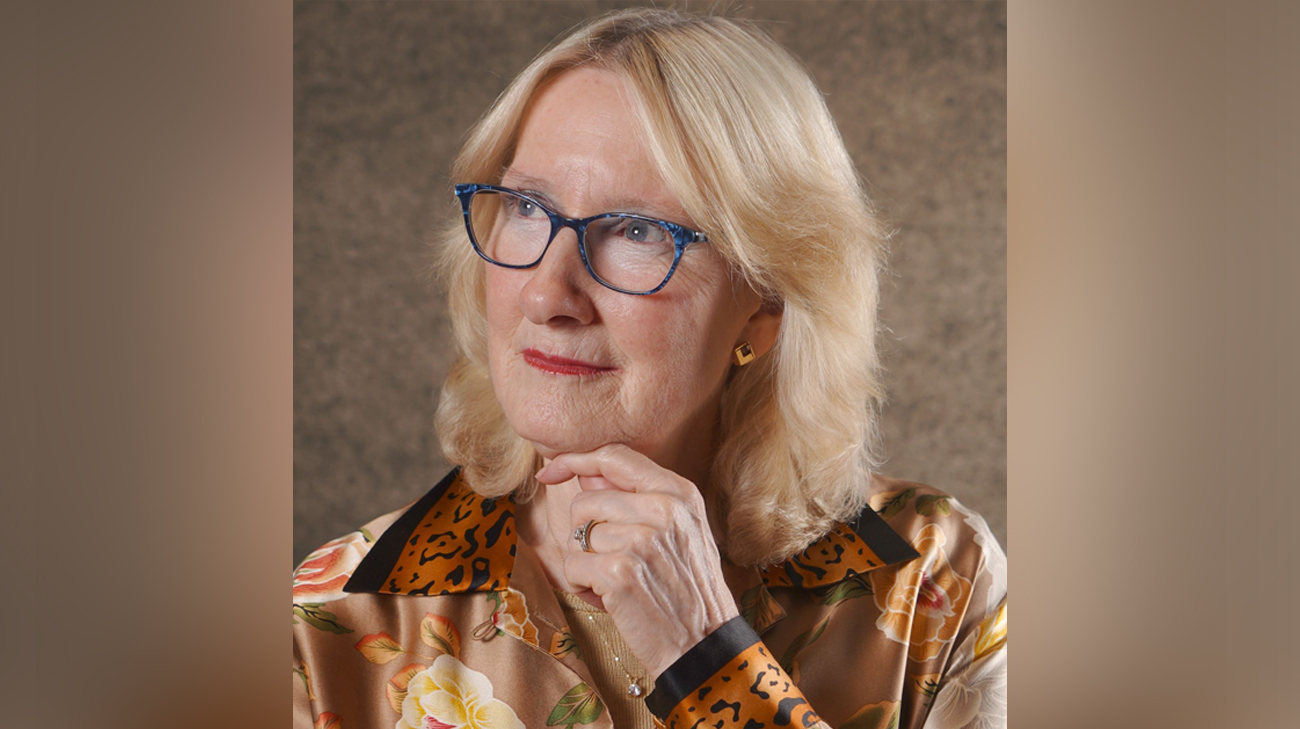
Corky Thacker is taking each day as it comes after receiving an unexpected diagnosis in 2020. Adamant about getting her annual mammogram, it was hard to process the news she would need continuous treatment for a rare, fast-growing form of breast cancer.
“I was totally shocked. This fell out of the sky. I wasn’t aware of any family history of breast cancer,” says Corky.
After a weekend of tending to her expansive rose garden, Corky noticed some discoloration on her breast. Since she had been working outside during a stretch of hot weather in May 2020, the pink and purple blotches Corky noticed were thought to be a heat rash. The discoloration eventually went away but came back a few months later.
“In November, it suddenly reappeared. I’m thinking, ‘It’s not hot out now. What is this,’” questioned Corky.

In her free time, Corky enjoys gardening as well as taking care of her two cats. (Courtesy: Corky Thacker)
She followed up with her primary care doctor. Although her screening mammogram and blood tests all came back clear, he referred her to a breast specialist. The diagnostic mammogram and ultrasound came back good, but the digital breast tomosynthesis (DBT) with computer aided detection (CAD) revealed an abnormality. A biopsy and further testing confirmed Corky, who was 64 at the time, had stage 4 inflammatory breast cancer (IBC).
IBC can be hard to diagnose because it doesn’t usually cause lumps in breast tissue and may not show up on a mammogram. Symptoms of IBC may include areas of discoloration (red, pink or purple), a bruise or rash spread over one-third of the breast. It’s considered a fast-growing cancer that only takes a few weeks or months to progress. Due to the cancer’s aggressive nature, Corky’s treatment plan is not necessarily designed to be a cure. It’s focused on prolonging life while maintaining her quality of life.
“I look at it like I’m managing a chronic condition while I continue doing other things in my life. I think that keeps me personally more on a positive, forward-looking track,” says Corky.
Although everyone responds differently to treatment, Corky shares some of the challenges she’s experienced. She recalls painful swelling from a reaction to the first chemotherapy drug. She also lost her appetite, was exhausted and had cracked, peeling skin with a new targeted therapeutic used with a different chemotherapy drug.
“At one point, I had absolutely no energy. I could barely drag myself up the stairs to go to bed. I was checking all the boxes on the list of side effects and then some,” says Corky.
With advancements in cancer treatment, there are more options available to patients. When Corky is experiencing harsh side effects from a certain medication, she brings it up to her care team so they can explore a different route. This type of open communication between a patient and their doctor is one of the things Cleveland Clinic cancer psychologist Kathleen Ashton, PhD, helps with.
“Oftentimes, patients have to weigh the side effects of their treatment versus their quality of life. Part of my job is to help patients with their communication skills and encourage them to have open conversations with their doctors,” says Dr. Ashton, who Corky sees as part of her care team. “Oncology providers are now much more in tune with how different treatments affect quality of life and find ways to manage those side effects.”
Another aspect Dr. Ashton has helped Corky with is approaching the difficult conversations that come after a cancer diagnosis with loved ones. Through different exercises, Corky has been able to more openly discuss topics regarding her diagnosis and treatment with close family.

After her diagnosis, Corky finished writing a novel. It’s something she’s always wanted to do, and she’s already thinking ahead to her next. (Courtesy: Corky Thacker)
Corky continues to work closely with her care team on an ongoing treatment plan that allows her to keep pursuing her passions, like gardening and writing. A milestone Corky has marked during treatment is finishing her first novel, which she’s set to self-publish.
“Writing a novel is something I’ve wanted to do since I was a child,” says Corky. “Dr. Ashton suggested self-publishing it, and I’m glad she did. Taking the conventional route takes years.”
With her first novel written, Corky is already thinking ahead to her next. The 68-year-old retiree continues taking it one day at a time.
“Spending time with my husband, snuggling with my cats, taking care of the garden – literally smelling the roses – those are the things I value,” says Corky.
Corky encourages others to not only keep up with their mammograms but to bring up any changes or new symptoms to their doctor as well. For those undergoing cancer treatment, she stresses the importance of being your own advocate and working with your care team to come up with an effective plan that takes quality of life into account. Corky says maintaining a positive mindset is also key and urges people to take care of their mental health.
“If someone is struggling with their diagnosis, I would highly recommend seeing a cancer psychologist like Dr. Ashton,” says Corky. “I love going to see her. It’s like having another friend who cares for me and is walking with me along this path.”
Dr. Ashton adds, “A lot of times there's so much focus on a patient’s physical health that their emotional health can be put to the side. But it's an important part of their treatment process. Be sure to reach out to the mental health resources that are available.”
Related Institutes: Cleveland Clinic Cancer Center

